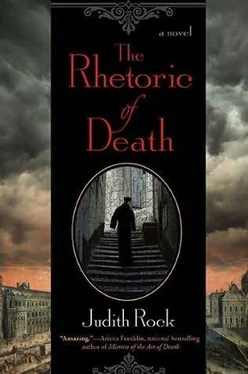Judith Rock - The Rhetoric of Death
Здесь есть возможность читать онлайн «Judith Rock - The Rhetoric of Death» весь текст электронной книги совершенно бесплатно (целиком полную версию без сокращений). В некоторых случаях можно слушать аудио, скачать через торрент в формате fb2 и присутствует краткое содержание. Жанр: Исторический детектив, на английском языке. Описание произведения, (предисловие) а так же отзывы посетителей доступны на портале библиотеки ЛибКат.
- Название:The Rhetoric of Death
- Автор:
- Жанр:
- Год:неизвестен
- ISBN:нет данных
- Рейтинг книги:3 / 5. Голосов: 1
-
Избранное:Добавить в избранное
- Отзывы:
-
Ваша оценка:
- 60
- 1
- 2
- 3
- 4
- 5
The Rhetoric of Death: краткое содержание, описание и аннотация
Предлагаем к чтению аннотацию, описание, краткое содержание или предисловие (зависит от того, что написал сам автор книги «The Rhetoric of Death»). Если вы не нашли необходимую информацию о книге — напишите в комментариях, мы постараемся отыскать её.
The Rhetoric of Death — читать онлайн бесплатно полную книгу (весь текст) целиком
Ниже представлен текст книги, разбитый по страницам. Система сохранения места последней прочитанной страницы, позволяет с удобством читать онлайн бесплатно книгу «The Rhetoric of Death», без необходимости каждый раз заново искать на чём Вы остановились. Поставьте закладку, и сможете в любой момент перейти на страницу, на которой закончили чтение.
Интервал:
Закладка:
“But he already told me he hardly saw the man-”
“Ask him again, talk him through it, he may remember something. Then come and tell me. Go on, hurry!”
Stifling a sob, Fabre stumbled back the way they’d come. At the top of the stairs Charles could hardly make his way through the excitedly appalled tutors and lay brothers blocking Antoine’s chamber door. Doissin lay on the floor in pools of vomit and Frere Brunet was on his knees beside him, closing his bulging eyes. Golden gaufres, shining with syrup, were scattered over the floor like giant’s coins, their sugar and vanilla sweetness strong even under the smells of death. The death that would have been Antoine’s, if this poor hapless man hadn’t been so greedy. Charles leaned down to Brunet.
“Was it poison, mon frere?” he said quietly.
The infirmarian looked up. “I think so. Most likely in the syrup. Aconite, perhaps, though a few others could act as fast. Those gaufres should be picked up, maitre, but keep the syrup from cuts or scratches, it could kill you.”
Out of the corner of his eye, Charles saw a gawking elderly lay brother lean into the room and pick a gaufre off the floor.
“Leave it!” He slapped it out of the man’s hand. “Unless you want to die like Maitre Doissin.”
The brother’s dull eyes were full of offense as he rubbed his slapped hand. “Why? He was possessed. I always thought so, the way he fell asleep all the time. A demon killed him, why shouldn’t I take a gaufre?”
“Why not, indeed?” someone said sardonically, and Frere Moulin’s face appeared, looking over the old man’s shoulder into the room. He grimaced and shook his head.
“Mon frere,” Charles said quickly, “will you see that our brother here washes his hands, and thoroughly?”
Moulin grunted assent, and Charles shut the chamber door and went into the study, closing that door, too, before the boys’ avid eyes could see around him. Antoine’s companions traded frustrated looks and slumped on their benches, but Antoine ran to Charles, who put an arm around him. One of the boys snickered and Charles shot him a look that made him bury his face in his Cicero.
Antoine looked up at Charles. His wet eyes were huge in his pale face. “Maitre Doissin is dead.”
“Yes, mon brave, he is. I’m sorry.” Charles was sorry, and not just because an innocent man had been murdered. For all his laziness, Doissin had given Antoine warmth and kindness, and Antoine had liked him.
The other boys erupted in questions. “Why? How? Was he sick? That old lay brother said it was demons!”
Deciding that a modicum of truth was better than demon rumors, Charles led Antoine back to his desk, sat him down, and addressed them all.
“Maitre Doissin was suddenly very sick and died of it.”
Antoine whispered, “We should pray for him, maitre.”
Charles led them in prayers for the suddenly dead. Then he waited a moment and said, “You are all to stay here until someone comes for you. I see that you have books and work to do, yes?”
All four of them looked with distaste at the quills, paper, Ciceros, and Latin grammars in front of them.
“Good,” Charles said briskly. “To your books now.”
The other three made at least a show of settling to work under Charles’s stern eye, but Antoine sat motionless.
“Maitre?” His voice was so small that Charles had to squat on his haunches to hear him. “Did he die because of me? Like Philippe?”
Charles took the boy’s cold hands. “Look at me, mon brave.”
The child brought his eyes up fleetingly and then looked down at his desk again, studying its scarred and initialled surface as though it were an examination text.
“Philippe and Maitre Doissin died because a grown-up person did evil things,” Charles said softly. “None of it is your fault. Do you understand?”
A tiny nod-in which Charles did not believe at all-was all his answer.
“Your uncle Jouvancy is coming for you, mon brave. You won’t be left alone.”
Charles patted his shoulder, murmured stern encouragement to the others, and went back to the chamber, where Brunet was praying beside the body. Charles took a towel from Antoine’s cupboard, covered his hand with it, and collected the spilled gaufres. As he laid them on the thick paper they’d come in, he wondered whether, if he’d killed the booted man in Pere La Chaise’s garden, Maitre Doissin would be alive. And whether, in the divine economy of sin, one outcome would have been better than the other.
Chapter 26
P ere Jouvancy arrived a few minutes later and led Antoine away, holding his hand as though he would never again let the child out of his sight. Frere Fabre returned, and he and Charles spoke at the head of the stairs, empty now of gawkers. Fabre’s freckles stood out sharply against his blanched skin as he tried not to look at the rewrapped package of gaufres in Charles’s hand.
“What did you learn from the porter, mon frere?”
“He-he said-maybe a woman left them. Maybe an hour ago. He didn’t see her face because she wore a long veil. Or a big shawl, maybe. Maitre, it could have been a man dressed in woman’s clothes.”
“Did she-or he-sound young or old?”
“Young. But some people sound young when they’re not. She-he-just said that the package was for Antoine.”
“Did the porter say anything else?”
“The gaufres might have come from the bakery next door. He said the little girl brought him one yesterday.”
Charles’s heart sank. If the LeClercs had sold them, the rector and the police would descend on the bakery, which was the last thing Pernelle needed. Not that he thought for a moment that the LeClercs had poisoned the gaufres. The bakery wasn’t even open today, it being Sunday, but the gaufres could have been bought yesterday and then poisoned. But what poisoner would be stupid enough to buy the gaufres next door?
“Do you have any cuts or scratches on your hands, Frere Fabre?”
The boy gaped at him. Charles grabbed one cold clammy hand and then the other. Finding stage scenery paint stains but no grazes, he thrust the package at Fabre.
“Stay here and give these to the rector when he comes. Do not put them down or give them to anyone else. Tell the rector to keep them wrapped. Frere Brunet will tell him the rest. Then wash your hands. Thoroughly. With soap. I’m going to see Mme LeClerc. I’ll be back as soon as I can.”
Leaving Fabre holding the package at arm’s length as though it might explode, Charles went to the street passage. The porter got up from his stool.
“Frere Martin,” Charles greeted him, “tell me again about whoever brought the gaufres.”
“I told it all to the boy. Poor cabbage, you’d think he’d never seen death.” Martin repeated his story, but it wasn’t quite the story Fabre had told. Martin was certain that the person under the mourning veil was a woman. Small, he said, and by the voice, young.
“Little hands, maitre. Gloved. Hot weather for that, but carrying poison, that explains it.”
“Who else has come and gone in the last hour or so? Professors, students? They may have seen something, if I can find them.”
The porter shook his head. “No one at all. Did young rooster head tell you those gaufres maybe came from next door? Little Marie-Ange brought me one yesterday. But it wasn’t poisoned, as you see!” He laughed heartily as he opened the postern for Charles.
Life, Charles thought sourly, was much less harrying for the unimaginative. To his relief, the bakery door stood open, no doubt to let out the strong smell of burned pastry that met his nose. Mme LeClerc, arranging cream cakes behind the counter, whirled when she heard him and her hard, unwelcoming expression stopped him in the doorway.
Читать дальшеИнтервал:
Закладка:
Похожие книги на «The Rhetoric of Death»
Представляем Вашему вниманию похожие книги на «The Rhetoric of Death» списком для выбора. Мы отобрали схожую по названию и смыслу литературу в надежде предоставить читателям больше вариантов отыскать новые, интересные, ещё непрочитанные произведения.
Обсуждение, отзывы о книге «The Rhetoric of Death» и просто собственные мнения читателей. Оставьте ваши комментарии, напишите, что Вы думаете о произведении, его смысле или главных героях. Укажите что конкретно понравилось, а что нет, и почему Вы так считаете.












